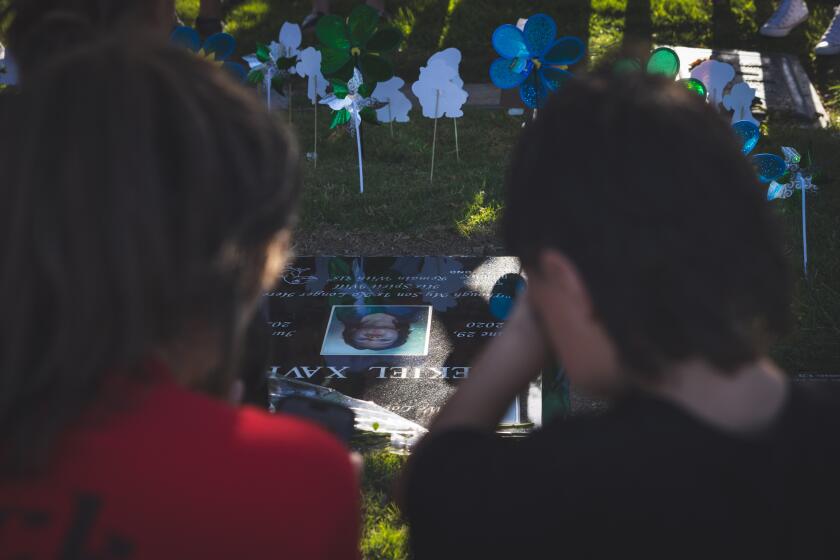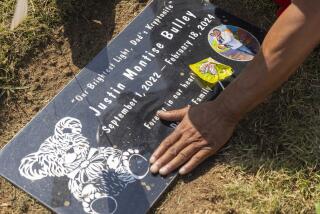A toddler died of a fentanyl overdose. DCFS trusted his mom’s friend to keep him safe

Secret Daniel was supposed to keep the bubbly toddler safe.
As a monitor approved by the L.A. County Department of Children and Family Services, she was responsible for supervising the Feb. 18 visit between Justin Bulley, who was just starting to talk at 17 months, and his mother, who had struggled with substance abuse throughout his short life.
DCFS had placed Justin and his two older siblings with a foster mother the previous year, after his mother’s boyfriend fatally overdosed on fentanyl with the kids at home.
Around 6:15 p.m., Justin’s mother called 911. The toddler had stopped breathing.
“It was fentanyl,” Justin’s grandfather told paramedics when they arrived at his Lancaster home, according to a sheriff’s report.
By that point, Daniel had left the home.
Daniel was not a social worker but a friend of Justin’s mother, Jessica Darthard. DCFS had approved her as a monitor, unaware that she was living in the Lancaster home with Justin’s grandfather, Jessie, who had a long history of heavy drug use, according to a county source familiar with Justin’s child welfare case who was not authorized to speak publicly.
Jessie Darthard, the grandfather, told sheriff’s deputies that he had fallen asleep on the couch while smoking fentanyl and awoke to Justin lying next to him, unresponsive.
Jessica Darthard, the mother, appeared inebriated, with slurred speech and bloodshot eyes, according to the deputies.
An autopsy would confirm that Justin died from exposure to fentanyl, a highly potent opioid that can be deadly to kids in the tiniest amounts.
Justin’s death highlights dangerous shortcomings in how DCFS decides who should watch a child spending time with a troubled parent and where those visits should take place.
“If you’re doing the job in a comprehensive manner, you’re going to want to figure out all of that,” said Michael Nash, a former presiding judge of L.A. County’s juvenile courts who now oversees the county’s Office of Child Protection. “Who is this family friend? What’s the relationship? Where do they live? What’s the background? It’s just common sense. It’s not rocket science.”
It’s common for a family to request that a friend or relative serve as a monitor for visits, instead of a social worker. But for DCFS to permit the arrangement for a child whose case involves recent fentanyl use is extremely unusual, said Sharon Balmer Cartagena, directing attorney of Public Counsel’s Children’s Rights Project.
“We usually see an overabundance of caution,” she said. “It just seems like such an aberration.”
According to police and social workers’ reports included in a 200-page file on Justin’s death, DCFS officials knew about Jessica Darthard’s recent history of substance abuse. Six months before he died, Justin was in the back seat, unbuckled, when his mother got in a wreck on the 405 Freeway, according to a DCFS report. Her blood-alcohol level was nearly three times the legal limit.
After Justin’s death, tests showed that his 3-year-old brother and 5-year-old sister also had fentanyl in their systems, according to a sheriff’s report.
So did Daniel’s three children, who were also living at the home, according to two county sources, one familiar with the criminal investigation and the other with Justin’s child welfare case, who were not authorized to speak publicly.
Since November, fentanyl has claimed the lives of at least three children in the Antelope Valley, which has the highest rate of youth fentanyl hospitalizations in L.A. County. This month, two more children — toddler twins — died in Los Angeles’ Winnetka neighborhood after authorities say they were exposed to fentanyl-laced drugs.

Jessie Darthard, 72, was addicted to heroin and had recently been released from jail, his daughter Jessica told detectives. On Jan. 22, he was arrested after his ex-girlfriend accused him of raping her with a glass narcotics pipe while they were both high on fentanyl, according to a sheriff’s report.
The morning of Feb. 18, he bought $20 of fentanyl off the street, smoking it throughout the day, he told detectives.
He fell asleep around 4 p.m. on the living room couch and awoke two hours later with the glass pipe in his hand, his grandson lying next to him, he told sheriff’s deputies.
When deputies arrived, foam was coming out of his grandson’s mouth.
He later denied falling asleep with the pipe.
Jessica Darthard, 38, was also napping that afternoon, her 5-year-old daughter told deputies. Darthard told them she had fallen asleep in a bedroom after taking a double shot of Jose Cuervo tequila.
She said she called 911 after her son fell off the bed and was knocked unconscious. After deputies arrived, she said she wanted to do another shot, according to a DCFS report.
Neither Darthard nor her father mentioned a monitor in any of the social worker or sheriff’s reports reviewed by The Times.
In Bakersfield, a 2-year-old died from acute fentanyl toxicity, and his father has been charged with murder. In California, there were 11 fentanyl-related deaths for children younger than 5 in 2023, according to preliminary data.
One report noted that Justin’s foster mother had released him and his siblings to the monitor but that “it was unknown if the monitor was with mother when the incident occurred and information was not being released about all of the adults who were there.”
Justin’s foster mother said her daughter had handed off the toddler and his siblings to Daniel that morning at a Taco Bell. Darthard gave detectives a conflicting account, saying she had picked up the kids from the foster mother a day earlier.
Kishena Jackson, who lives next to the Darthard home, told The Times that Daniel came over with grocery bags around 7 p.m., saying she was unable to go home because of the caution tape and police cars. Daniel did not seem to know why law enforcement was there, Jackson said.
Daniel and Jessie Darthard did not respond to a letter left on the doorstep of their home.

DCFS officials declined to answer a list of questions about Justin’s case, citing state confidentiality laws. The child welfare agency had opened four cases involving Darthard since 2012 and had monitored Justin on and off since his birth, when Darthard tested positive for marijuana.
DCFS said in a statement that supervised visits are critical to a child’s emotional health and can ease the path for a parent to regain custody. A monitor is required for these visits if there are safety concerns, the agency said.
DCFS nearly always pushes for a monitor to oversee parental visits, even when there’s no obvious danger to the child, which can make visitations difficult to arrange, said Brooke Huley, a supervising attorney with Los Angeles Dependency Lawyers. She called DCFS’ discretion over the selection of monitors “wide and nearly unfettered.”
Monitors must pass a background check, be financially independent of the parent and “have no conflict of interest,” according to DCFS policy. Family friends or relatives are not paid to be monitors.
Nash, the head of the county child protection office created after the brutal murder of 8-year-old Gabriel Fernandez, said he would expect a DCFS worker to periodically sit in on visits where a family friend is the monitor.
“What we’ve seen is when a relative or a friend is a monitor … they don’t really monitor. They just let the parent be with the kid without really monitoring the visit,” he said. “We see that happen enough times to be concerned.”
Justin’s father, Montise Bulley, plans to sue DCFS for $65 million, accusing the agency of failing to protect his son by putting him in the care of a monitor with a conflict of interest.
“She’s the one person that is hired to safeguard these kids, and to the extent that she has any kind of relationship with the parent she is supposed to be monitoring, that’s categorically unacceptable,” said Bulley’s attorney, Brian Claypool, who has represented families reeling from some of L.A.’s most harrowing recent cases of child abuse and neglect.
Bulley was estranged from Jessica Darthard and said he had been trying to gain custody of Justin.
In a brief email, Darthard said Bulley was “lying about that night.”
“As a grieving mother the lies and all this is to [sic] much,” she wrote. “I have children that saw that and now is not the time.”
Social workers described the three-bedroom beige Lancaster home as “the family home” and the “mother’s residence” in reports written after Justin’s death.
Darthard told detectives she was homeless and only went to the house for visits with the kids. She said it belonged to her brother, who suffered from seizures and smoked “sherm,” a slang term for cigarettes dipped in PCP, according to a sheriff’s reports.
Jackson, the neighbor, said that when she moved in about a year ago, Daniel was already living next door. Darthard was often next door as well, Jackson said.
Justin’s autopsy report said that all three Darthards lived at the residence.
DCFS policy does not explicitly bar monitors from living with the parent they’re overseeing. But some experts said it would be highly unusual and could be seen as a conflict of interest.

Justin’s foster mother said she had been trying to stop the supervised visits because she believed Darthard was drinking during them. She said Darthard sometimes smelled of alcohol.
A social worker told her that Darthard was entitled to see the children.
“When I tried to speak up, nobody wanted to hear it. All they kept saying is, ‘She has to have her visit, she has to have her visit,’” she said, her voice cracking. “Look what happened.”
The foster mother, who told The Times she did not want to be interviewed but talked from her doorstep in Palmdale, said she had been trying to adopt Justin and his two siblings.
After Justin died, she said, DCFS removed the siblings from her care, accusing her of neglect.
Investigators are working with prosecutors to determine whether to file criminal charges, said Lt. Michael Gomez of the L.A. County Sheriff’s Department’s homicide division.
Montise Bulley, 52, said he holds DCFS responsible for his son’s death.
Bulley said he battled a drug problem that landed him in prison seven times as his three older kids grew up. For Justin, his “twin,” he wanted a different childhood. He became a truck driver and tried to get clean.
At the children’s section of Inglewood Park Cemetery last week, Bulley placed Justin’s stuffed Elmo on top of the boy’s gravestone.
“Our Brightest Light,” the stone reads. “Dad’s Kryptonite.”
Times staff writer Grace Toohey contributed to this report.
More to Read
Sign up for Essential California
The most important California stories and recommendations in your inbox every morning.
You may occasionally receive promotional content from the Los Angeles Times.











